翻译的基本技巧--转变词性
句子翻译技巧一:词类转换

example
1967年联合国文件要求在以色列撤出所占 的土地以及阿拉伯承认以色列的生存权 利的基础上来解决中东冲突。
example
• 2.The sight and sound of our jet planes filled me with special longing.
• 看到我们的喷气式飞机,听见隆隆的 机声,令我特别神往。含有动作意味 的名词(在记叙、描写文体中出现较 多)往往可以转译成动词。
• 说以身作则是影响人的主要方法,那是 不对的。它是影响人的唯一方法。
• Wait for a break in the traffic before crossing the road.
• 要等到暂无车辆来往时,才能过马路。
example
• To some extent it gets into the question of the chicken or the egg.
3. 形容词译成动词
形容词转译成副词
英语名词译成汉语动词时,修 饰该名词的形容词往往转译 成汉语副词
example
• It was a clear and unemotional exposition of the President's reasons for willing to begin a Chinese-American dialogue.
example
• The car braked sharply, coming to rest on the edge of the cliff.
• 汽车猛的刹住,停在悬崖边上.
example
• They took a final look at Iron Tower, still intact in the darkness.
翻译方法—词性转换
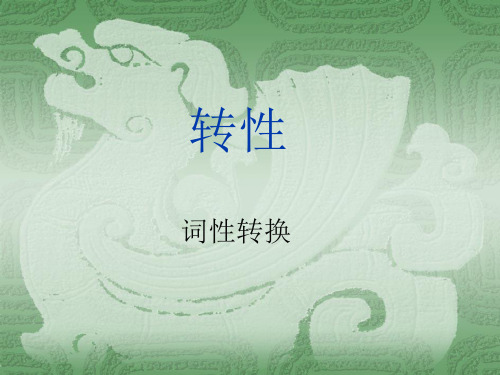
Until such time as mankind has the sense
to lower its population to the points where the planet can provide a comfortable support for all, people will have to accept more " unnatural food".
“印象”在汉语中只有名词词性,但英译时既可用名词 “impression”,也可用动词“impress”来表达。
2. 这种举止是罪犯的心理特征。 1. 他在剧中精彩的表演给我留下深刻的印象。
•This kind of behavior characterizes the criminal mind.
IBM公司计划拿出一些新产品与外国公司竞争。
2. 名词转译成形容词
(1)由形容词派生的名词 (2)a ∕ an+名词作表语时 a. The music is a gas. 这音乐妙极了。 As he is a perfect stranger in the city, I hope you will give him the necessary help. 他对这个城市完全陌生,我希望您能给他必要的帮助。
everything about the book except its publication.
•还有一些人同意这本书的每一句话,就是不同意出版这本书。
Rockets have found application for the exploration of the universe.
火箭已用来探索宇宙。
我们欢迎您周日晚到我校作报告。 这里的“speaker” 是由“speak+er”构成的名词,与 “guest” 组成“特邀演讲者”,“特邀报告者”,但如果将上句直译 成“欢迎您周日到我校当特邀演讲者”不很规范,显得说话 者汉语表达不地道。既然这样,不妨将“a guest speaker”转 换成动词,更通顺。
翻译的基本技巧--转变词性
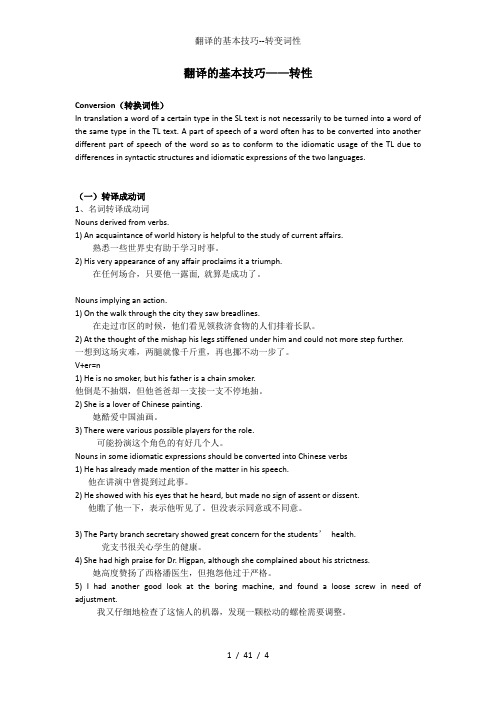
翻译的基本技巧——转性Conversion(转换词性)In translation a word of a certain type in the SL text is not necessarily to be turned into a word of the same type in the TL text. A part of speech of a word often has to be converted into another different part of speech of the word so as to conform to the idiomatic usage of the TL due to differences in syntactic structures and idiomatic expressions of the two languages.(一)转译成动词1、名词转译成动词Nouns derived from verbs.1) An acquaintance of world history is helpful to the study of current affairs.熟悉一些世界史有助于学习时事。
2) His very appearance of any affair proclaims it a triumph.在任何场合,只要他一露面, 就算是成功了。
Nouns implying an action.1) On the walk through the city they saw breadlines.在走过市区的时候,他们看见领救济食物的人们排着长队。
2) At the thought of the mishap his legs stiffened under him and could not more step further.一想到这场灾难,两腿就像千斤重,再也挪不动一步了。
英语翻译技巧中词性的转化策略分析

英语翻译技巧中词性的转化策略分析在英语翻译中,常常会面临需要将某个词语的词性进行转化的情况,这种情况在词汇丰富的英语中尤为常见。
为了在翻译过程中准确传达语义,翻译者需要灵活运用多种策略对词性进行转化。
一、名词转动词。
名词转动词是英语中最常见的词性转化之一。
英语中很多名词可以转化为动词,如:love(爱),problem(问题),memory(记忆)等。
这些名词转化为动词时可以直接在后面加上动词后缀,如-ize,-ate,-ify等,例如:love→love+ize=lovelize(使……爱上),problem→problem+ize=problemize(使……成为问题),memory→memory+ize=memorize(记忆)。
三、形容词转副词。
在英语中,很多形容词也可以转化为副词,如quick(快速的),slow(缓慢的),happy (快乐的)等。
将形容词转化为副词的方式是添加-adverb后缀。
例如:quick→quick+ly=quickly(快速地),slow→slow+ly=slowly(缓慢地),happy→happy+ly=happily(快乐地)。
动词转化为形容词是英语中较为少见的词性转化之一,但也是翻译中常见的情况。
将动词转化为形容词的方法是在动词后面添加形容词后缀,如-able,-ible,-ful等。
例如:talk→talk+able=talkable(健谈的),laugh→laugh+able=laughable(可笑的),help→help+ful=helpful(有帮助的)。
总之,在英语翻译中,正确应用词性转化策略可以更准确地传达语义,提高翻译的质量和效率。
不同词性转化之间的界限有时不是很明确,所以在选择和使用转化策略的时候,需要根据具体语境和意义做出正确的判断。
英语翻译技巧中词性的转化策略分析

英语翻译技巧中词性的转化策略分析
引言:
词性的转化是翻译过程中常见的问题之一,正确的处理词性的转化可以确保译文的准确性和流畅性。
本文将分析英语翻译技巧中处理词性转化的策略。
一、名词转化为动词:
将名词转化为动词是常见的词性转化。
英语中的名词“concept”可以转化为动词“conceptualize”,译文可以为“概念化”,这样可以更准确地表达原文的含义。
对于名词转化为动词的处理,有以下几个策略:
1. 添加动词后缀:可以根据英语动词的后缀规则,如“-ize”、“-ate”、“-en”等来将名词转化为动词。
名词“length”可以转化为动词“lengthen”,译文可以为“延长”。
2. 使用合适的动词短语:有些名词转化为动词不便使用后缀的情况下,可以使用动词短语来表示。
名词“decision”可以转化为“make a decision”,译文可以为“做决定”。
四、副词转化为形容词:
副词转化为形容词相对较少见,但也是需要处理的词性转化之一。
英语中的副词“fast”可以转化为形容词“fastest”,译文可以为“最快的”。
结论:
词性的转化在英语翻译中常常遇到,合理处理词性转化可以提高翻译的准确性和流畅性。
通过添加合适的后缀或使用相应的短语,可以将词性转化得更恰当。
需要根据具体语境和要求选择最合适的处理策略。
以上分析的策略可以作为英语翻译中处理词性转化的参考。
翻译的词性转换技

转译成动词
1. Rockets have found application for the exploration of the universe. 2. In China, there is a lot of emphasis on politeness. 3. A careful study of the original text will give you a better translation. 4. The sight and sound of our jet planes filled me with special longing. 5. He is a good singer. 6. Those small factories are also lavish consumer and waster of raw materials.
7. You must be tired. Why don’t you take a rest? 8. I am anxious about his health. 9. Doctors have said that they are not sure they can save his life. 10. Scientists are confident that all matter is indestructible. 11. She opened the window to let fresh air in. 12. After careful investigation they found the design behind.
翻译技巧丨英语翻译之词性转换
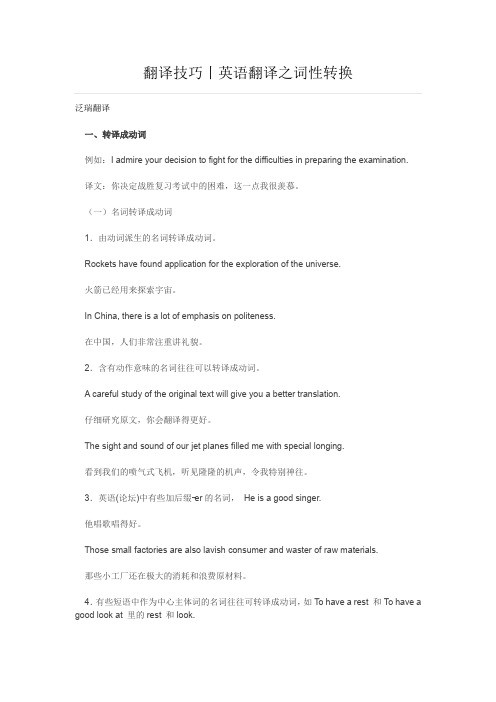
翻译技巧丨英语翻译之词性转换泛瑞翻译一、转译成动词例如:I admire your decision to fight for the difficulties in preparing the examination.译文:你决定战胜复习考试中的困难,这一点我很羡慕。
(一)名词转译成动词1.由动词派生的名词转译成动词。
Rockets have found application for the exploration of the universe.火箭已经用来探索宇宙。
In China, there is a lot of emphasis on politeness.在中国,人们非常注重讲礼貌。
2.含有动作意味的名词往往可以转译成动词。
A careful study of the original text will give you a better translation.仔细研究原文,你会翻译得更好。
The sight and sound of our jet planes filled me with special longing.看到我们的喷气式飞机,听见隆隆的机声,令我特别神往。
3.英语(论坛)中有些加后缀-er的名词,He is a good singer.他唱歌唱得好。
Those small factories are also lavish consumer and waster of raw materials.那些小工厂还在极大的消耗和浪费原材料。
4.有些短语中作为中心主体词的名词往往可转译成动词,如To have a rest 和To have a good look at 里的rest 和look.You must be tired. Why don’t you take a rest?你一定很累了,为什么不休息一会呢?The car braked sharply, coming to rest on the edge of the cliff.汽车猛的刹住,停在悬崖边上。
英汉翻译中词性转换的技巧-PPT资料

(3) Cheerful, efficient and warm-hearted, they will do everything to make your journey smooth and comfortable.
他们乐观、能干、热情,总是想方设法使你一路 上顺利舒适。(状语转换为谓语)
句子成分转换是指英语中的某一句子成分译成汉语时 转换成另一种句子成分。句子成分转换在主语、谓语、
宾语、定语、状语和补语之间展开。
(1) You can always tell the somebodies from the nobodies at a cocktail party. The somebodies come late. 在鸡尾酒会上人们常常可以看出大人物和无名小卒来。那 些迟到的就是大人物。(主语转换为表语;谓语转换为主 语)
她到车站不一会儿,他便出现在她的身旁,听见他喘息的 声音。她凝视着前方,表情严峻。
(5) Yet to both classes the need of an alternative outlook, of a change of atmosphere, of a diversion of effort, is essential.
(13) Most US spy satellites are designed to burn up in the earth's atmosphere after completing their missions.
美国绝大多数间谍卫星,按其设计,是在完成使命后,在 大气层中焚毁。
二、 句子成分转换
(9) He added: "I understand and respect those views, but I deeply believe in the correctness of my decision." 他还说:"我理解并尊重他们的看法,但我深信我的决定 是正确的。"
英语翻译技巧中词性的转化策略分析
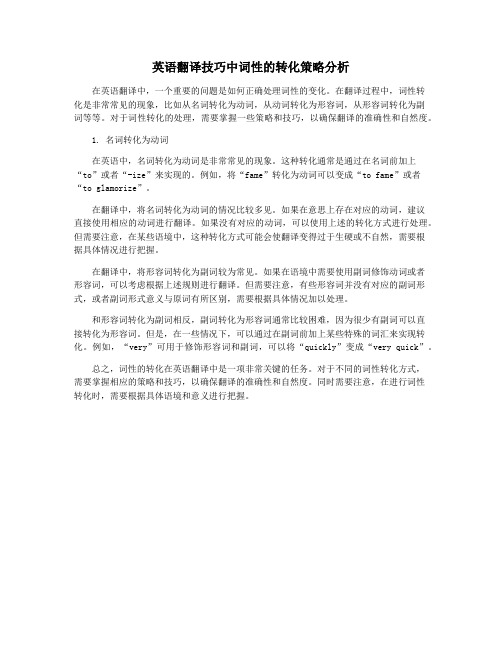
英语翻译技巧中词性的转化策略分析在英语翻译中,一个重要的问题是如何正确处理词性的变化。
在翻译过程中,词性转化是非常常见的现象,比如从名词转化为动词,从动词转化为形容词,从形容词转化为副词等等。
对于词性转化的处理,需要掌握一些策略和技巧,以确保翻译的准确性和自然度。
1. 名词转化为动词在英语中,名词转化为动词是非常常见的现象。
这种转化通常是通过在名词前加上“to”或者“-ize”来实现的。
例如,将“fame”转化为动词可以变成“to fame”或者“to glamorize”。
在翻译中,将名词转化为动词的情况比较多见。
如果在意思上存在对应的动词,建议直接使用相应的动词进行翻译。
如果没有对应的动词,可以使用上述的转化方式进行处理。
但需要注意,在某些语境中,这种转化方式可能会使翻译变得过于生硬或不自然,需要根据具体情况进行把握。
在翻译中,将形容词转化为副词较为常见。
如果在语境中需要使用副词修饰动词或者形容词,可以考虑根据上述规则进行翻译。
但需要注意,有些形容词并没有对应的副词形式,或者副词形式意义与原词有所区别,需要根据具体情况加以处理。
和形容词转化为副词相反,副词转化为形容词通常比较困难,因为很少有副词可以直接转化为形容词。
但是,在一些情况下,可以通过在副词前加上某些特殊的词汇来实现转化。
例如,“very”可用于修饰形容词和副词,可以将“quickly”变成“very quick”。
总之,词性的转化在英语翻译中是一项非常关键的任务。
对于不同的词性转化方式,需要掌握相应的策略和技巧,以确保翻译的准确性和自然度。
同时需要注意,在进行词性转化时,需要根据具体语境和意义进行把握。
英语翻译技巧中词性的转化策略分析

英语翻译技巧中词性的转化策略分析
在英语翻译中,词性的转化是一种常见的技巧,它可以通过改变词的词性来表达不同
的意思或者将句子翻译得更加准确。
一、名词转动词
将名词转化为动词可以使句子更加动态和有力,表达行为和动作。
例句:The sun shines brightly.(太阳明媚地照耀着。
)
分析:将名词“sun”转化为动词“shine”,使句子表达得更加活跃和生动。
二、名词转形容词
将名词转化为形容词可以修饰名词,起到形容和限定的作用。
例句:A cat-like smile appeared on her face.(她脸上浮现出猫一样的微笑。
)
分析:将名词“cat”转化为形容词“cat-like”,修饰名词“smile”,使句子更加
形象和生动。
三、名词转副词
将名词转化为副词可以修饰动词,表示方式、程度或者时间。
例句:He spoke softly.(他轻声地说。
)
分析:将名词“soft”转化为副词“softly”,修饰动词“speak”,表示说话的方式。
例句:The swim was refreshing.(游泳使人感到心旷神怡。
)
分析:将动词“swim”转化为名词“swim”,通过加上冠词“the”表示特定的动作,并将其形容为令人耳目一新的状态。
总的来说,词性的转化是英语翻译中常用的技巧之一。
通过改变词的词性,可以使句
子更加具体、清晰和生动,从而准确地传达原文的意思。
在进行词性转化时,需要根据具
体的语境和需要进行选择,并且要注意转化后的词是否符合语法规则和上下文的逻辑关
系。
英汉翻译技巧词性转换
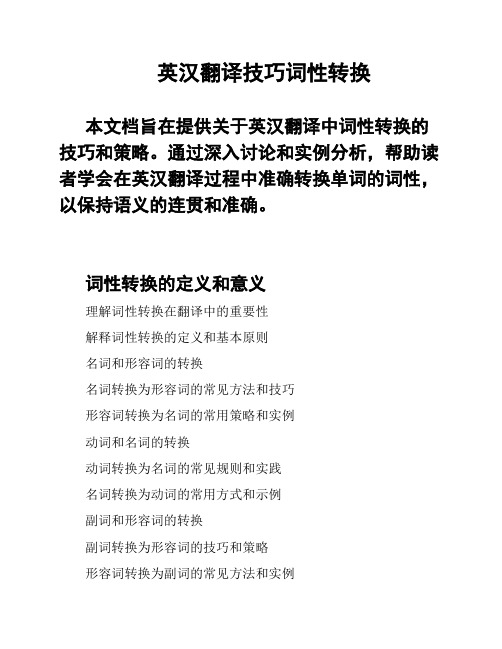
英汉翻译技巧词性转换本文档旨在提供关于英汉翻译中词性转换的技巧和策略。
通过深入讨论和实例分析,帮助读者学会在英汉翻译过程中准确转换单词的词性,以保持语义的连贯和准确。
词性转换的定义和意义理解词性转换在翻译中的重要性解释词性转换的定义和基本原则名词和形容词的转换名词转换为形容词的常见方法和技巧形容词转换为名词的常用策略和实例动词和名词的转换动词转换为名词的常见规则和实践名词转换为动词的常用方式和示例副词和形容词的转换副词转换为形容词的技巧和策略形容词转换为副词的常见方法和实例例句分析与实践提供一些实际例句进行分析和转换实践深入探讨例句中词性转换的技巧和注意事项总结与扩展对本文档中所涉及的词性转换技巧进行总结和回顾提供更多补充资料和延伸阅读资源请注意,本文档的目标是提供简洁明了的指导,避免复杂的法律问题并独立进行决策。
导言请注意,本文档的目标是提供简洁明了的指导,避免复杂的法律问题并独立进行决策。
导言英汉翻译技巧词性转换》是一本重要的翻译技巧手册,它涉及到了词性转换在英汉翻译中的应用。
词性转换指的是将一个词的词性从一种转换为另一种,以达到更恰当地表达原文含义的目的。
英汉翻译技巧词性转换》是一本重要的翻译技巧手册,它涉及到了词性转换在英汉翻译中的应用。
词性转换指的是将一个词的词性从一种转换为另一种,以达到更恰当地表达原文含义的目的。
词性转换在翻译过程中具有广泛的应用领域。
它可以帮助翻译者解决一些句子难以准确翻译的问题,提高翻译质量和可读性。
无论在文学作品、商务文件还是学术论文等领域,词性转换都起到了不可忽视的作用。
在《英汉翻译技巧词性转换》中,我们将介绍一些简单且没有法律复杂性的策略和技巧,旨在帮助翻译者更好地掌握词性转换的方法。
我们鼓励翻译者发挥自己的优势,并遵循简洁明了的原则,不引用无法确认的内容。
无论是英汉互译还是汉译英,词性转换都是一个关键技巧。
通过研究和掌握《英汉翻译技巧词性转换》,您将能够更好地处理词性转换的问题,提升翻译水平。
翻译方法—词性转换课件

06
常见错误与纠正方法
常见错误类型
词性误用
在翻译过程中,学生常常 因为对词性掌握不够准确, 导致翻译时词性使用不当。
语法错误
由于对目标语言的语法规 则理解不透彻,学生在翻 译过程中容易出现语法错误。
语义偏差
在翻译过程中,学生可能 因为对原文理解不准确, 导致译文语义与原文存在 偏差。
错误纠正方法
加强词汇积累
提高阅读理解能力
学生应注重词汇的积累,尤其是对词 性的掌握,以提高翻译的准确性。
通过大量阅读,提高对原文的理解能 力,确保译文语义准确。
学习语法规则
深入学习目标语言的语法规则,理解 不同词性在句子中的功能和用法。
练习与提高
多做翻译实践
通过大量的翻译实践,学生可以 不断纠正自己的错误,提高翻译
05
词性转换实践练习
单句练习
总结词
通过简单句子的翻译练习,掌握基本的词性转换技巧。
详细描述
提供一系列包含特定词性的英文句子,要求学习者将其翻译成中文,并注意转换相应的词性。例如, “She is a talented artist.”可翻译为“她是一位有天赋的艺术家。”(名词转换为形容词)。
段落练习
在翻译过程中,由于语言结构和 表达习惯的差异,有时需要采用 词性转换来确保译文自然、流畅, 同时避免歧义和误解。
常见转换类型
名词与动词转换 例如,将英语中的动词"to study"转 换为中文名词"研究"。
动词与名词转换
例如,将中文动词"学习"转换为英文 名词"study"。
形容词与名词转换
例如,将英文形容词"beautiful"转换 为中文名词"美景"。
英汉翻译中词性转换的技巧

In science, it is important to state a law or a principle accurately. 在科学方面定律或定理的准确叙述十分重 要。 With slight repairs, the machine could be in motion. 只要称加修理,这台机器便可以运转。 From the front, back and both sides we kept a strict watch on the enemy. 我们在前后左右严密地监视敌人。
Exercise
Difference between the social system of states shall not be an obstacle to their approach and cooperation.
国与国社会制度的不同应妨碍彼此的接近与合 作。 It is our goal that the people in the undeveloped areas will be finally off poverty. 我们的目标是使不发达地区的人民最终摆脱贫 困。
英汉翻译中词性转换的技巧
由于英汉两种语言在语法和表达方式 等方面存在着许多差异,因此英译汉 时常常有必要改变表达方式,使译文 通顺流畅、地道可读。这种变通技巧 就是转换法(shift of perspective)。转 换的形式多种多样,大体可分为7种: ①词类转换,②句子成分转换,③表 达方式转换,④自然语序与倒装语序 转换;⑤正面表达与反面表达转换, ⑥主动式与ey had a dozen children, six boys and six girls, in seventeen years. 在17年中,他们生了12个孩子,6男6女。 (5) She has been a widow only for six months. 她丈夫死了至今才不过半年。 (原文是从妻子的角度加以陈述的,而译文是从 丈夫的角度加以陈述的。如果不改变表达方式, 而搬用原来的表达方式,那译文就是:"她只当了 6个月的寡妇。"这就会给人以错觉:她很快就改 嫁了。) (6) ──Is there a special rate by the month? ──Yes, there is a 10% discount. ──按月计算有什么优惠吗? ──有,可以打9折。
英汉翻译中的词类转换技巧
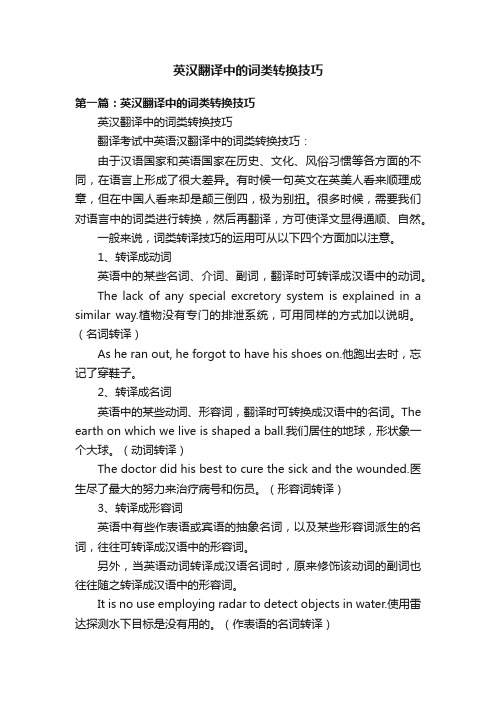
英汉翻译中的词类转换技巧第一篇:英汉翻译中的词类转换技巧英汉翻译中的词类转换技巧翻译考试中英语汉翻译中的词类转换技巧:由于汉语国家和英语国家在历史、文化、风俗习惯等各方面的不同,在语言上形成了很大差异。
有时候一句英文在英美人看来顺理成章,但在中国人看来却是颠三倒四,极为别扭。
很多时候,需要我们对语言中的词类进行转换,然后再翻译,方可使译文显得通顺、自然。
一般来说,词类转译技巧的运用可从以下四个方面加以注意。
1、转译成动词英语中的某些名词、介词、副词,翻译时可转译成汉语中的动词。
The lack of any special excretory system is explained in a similar way.植物没有专门的排泄系统,可用同样的方式加以说明。
(名词转译)As he ran out, he forgot to have his shoes on.他跑出去时,忘记了穿鞋子。
2、转译成名词英语中的某些动词、形容词,翻译时可转换成汉语中的名词。
The earth on which we live is shaped a ball.我们居住的地球,形状象一个大球。
(动词转译)The doctor did his best to cure the sick and the wounded.医生尽了最大的努力来治疗病号和伤员。
(形容词转译)3、转译成形容词英语中有些作表语或宾语的抽象名词,以及某些形容词派生的名词,往往可转译成汉语中的形容词。
另外,当英语动词转译成汉语名词时,原来修饰该动词的副词也往往随之转译成汉语中的形容词。
It is no use employing radar to detect objects in water.使用雷达探测水下目标是没有用的。
(作表语的名词转译)The sun affects tremendously both the mind and body of a man.太阳对人的身体和精神都有极大的影响。
翻译中词性转换的技巧

翻译中词性转换的技巧一 .研究课题的目的和意义汉语与英语在词法和语言结构方面都存在着很大的差异。
因此,为了达到既忠实于原文又准确流畅的目的,翻译时应掌握一些必要的翻译技巧,词性转换即是其中之一。
词性是词在语法意义上的性别, 它表示词所属的类别, 是词的表述功能的外在标记。
词性转换是指翻译时为了正确而顺畅地表达原文内容而改变词的属性,即改变词性。
在汉译英语句子时,使每一个英语单词都有一个与之词义和词性均相同的汉语词相对应是几乎不可能的。
若一定要用词性相同的汉语词来译出英语原旬,那么,汉语译文常常会因不符合汉语的语言习惯及规范而读起来非常别扭,甚至艰涩难懂。
词性转换在汉译英翻译中是一项技巧,其关键在于源语与目的与之间的词汇和句子结构差异较大。
本文旨在探索在翻译的过程中如何更好地在翻译中使用词性转换的技巧,从而帮助大家逐步提高翻译能力和更加灵活运用词性转换这一翻译技巧。
使其翻译的句子准确通顺,将由于英汉差异而引起的语言机械转换,根据表达习惯进行适当调整和转换,使译文变得更加的妥帖、顺畅。
二.文献综述刘小芬,杨筱霞在《再谈英汉互译中的词性转换》提出然而,许多人认为,翻译最大的障碍应该是两种语言的不同词性的转换。
因为一种语言中的任何一个词并不总是能够在另一种语言中找到词性相同而词义又完全一样的词。
只有通过改变原文的某种词性才能够更有效地传达出原文的准确意思。
这种把一种语言中的某种词性转换成另一种语言的另一种词性来表达的翻译方法就是词性的转换。
谢捷在《英语名动转用中不同种类名词的转用几率探析》中提出“名词转化动词是基于原型名词的语义特征和所属语义种类确立其词义的,语言学家提出了多种转类动词的划分。
”陆俭明在《现代汉语语法研究教程(第三版)》中提到兼类词。
兼类词指“同一个概括词兼有两种词类特性的词,即指同音同义而词性不同的词”郑蕙在《论英汉翻译中的词性和句形转换》中提出“在英汉翻译过程中,因为汉、英两个民族不同的思维模式以及相关的社会背景环境和文化的不同给汉英翻译造成一定困难,所以有“语随境迁,语无定义”之说。
翻译技巧---词类转换法

Bright warm days follow clear cool nights. 白日明媚温暖,夜晚清澈凉爽。
在翻译过程中, 如果绝对地按照原语的词 性进行翻译,有时译文会显得晦涩或不符 合译语的表达习惯。这时, 我们可以对原
语的词性进行转换翻译。英译汉中常见的 词性转换有以下几个方面。
一、 转译成动词 (Converting into verbs)
1. 名词转译成动词( n.---v. )
英语中具有动作意义的名词,汉译时往往可转化为动词。
Families upstairs have to carry pails to the hydrant downstairs for water.
In those years the republicans were in. 那些年是共和党执政。
Double windows were fixed to keep the cold out. 安装双层窗御寒。 动名词转译成动词(gerund---v.) The origin of this particular culture is far from clearing. 这种奇特的文化根源远没有弄清楚。
翻译技巧---词类转换法
Those small factories are also lavish consumers, and wasters, of raw materials.
原译:那些小厂还是原材料的消费者和浪费者。 改译:那些小厂还极大地消耗和浪费了原材料。
This watch never varies more than a second in a month.
不管天气情况如何,气象观察站的工作都正常进 行,毫不间断。
汉译英翻译技巧之转性词翻译-课件

•
注解:副词“非常”译成了形容词“great”,因为动
词“成功”转译为了名词“success”。
总结:
• 在翻译之前,要熟悉汉语和英语各自的特色,要将整个句 子的结构、表达方式和句语句之间的内在联系都考虑在内。 这样才能灵活恰当地运用汉英语言中的不同词性转换,才 能使译文更流畅,才能与原文在风格表现上保持一致,甚 至更胜一筹。
•
1)富人剥削穷人。
• The rich exploited the poor.
•
2)年轻人迟早要取代老年人。
• Sooner or later the young will replace the old.
三、形容词或副词的转译
•
(一)形容词或副词转译为名词
•
在有些场合下,汉语句子中的形容词或副词会被转译
Thank you 期末必过
2024/10/1
9
enthusiasm of his hospitality.
•
她身体虽弱,但思想健康。
•
ቤተ መጻሕፍቲ ባይዱ
She is physically weak but mentally sound.
•
注解:名词“身体”和“思想”转换成了副词
“physically”和“mentally”。
(二)副词转译形容词或形容词转译副词
• ) (动2词)的操转作译机器需要懂得机名器词的的一转些译性能。 形容词或副词的转译
•
The operation of a machine needs some knowledge of its function(动词转
译名词)
•
(3)他到商店去买酱油。
•
He went to the shop for a bottle of sauce.(动词转译介词)
翻译方法—词性转换讲解
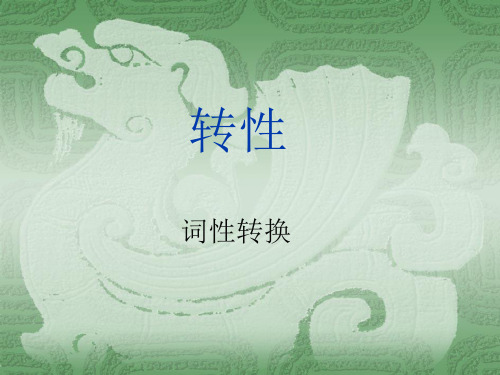
我未必会教你游泳,我想我的小弟弟比我教得好。
O. Henry is the creator of a new short story genre in literature.
(3)在一些短语当中,作为中心词的名词往往也可 以翻译成为动词
The next news bulletin, short than usual, made no mention of the demonstration.
下一个新闻节目比通常的要短,没有提到游行。
另外,在to have a good rest, to have a look at等短语, rest和look也都可以译为动词。
除非人类终于意识到要把人口减少到这样的程度:使地球能为 所有的人提供足够的饮食,否则将不得不接受更多的"人造食 品"。 (在原文中sense是名词,作has的宾语,但在have the sense (of sth./to do sth.)中sense是习语的主体,故译成汉语 时常可转译为动词"意识到"。)
难怪老一辈的人见了这个就会想到36年前的往事。
One after another, speakers called for the downfall of imperialism, abolition of exploitation of man by man, liberation of the oppressed of the world.
•由于世界普遍缺乏粮食,这就直接影响到科威特和其它沙漠国 家。
汉译英翻译技巧分析解析

5. 连贯主语
五十年代初期,美国企图征服朝鲜,但是中朝军民共 同努力,最后打败了他们。 In the early 1950s, the U.S tried to conquer Korea, but finally were defeated by the joint efforts of the army and people of Korea and China.
若以过去的增长率来预测未来,会显得考虑欠周,因 为那种预测会严重夸大未来的实际增长。 A naï ve projection of their past growth rates into the future was likely to greatly overstate their real prospects.
Through reading one can acquire knowledge.
得第一名获金牌,第四名什么也拿不到。
Whoever comes first wins a gold medal but anyone who comes fourth gets nothing.
4. 信息主语
报告的其他部分没有提到这一点。
2. 词义的表达 汉语中的“水平”,英语根据不同搭配用不同的 词:
提高生活水平upgrade the living standard
提高会话水平 improve one’s conversational ability
提高领导水平 improve the art of leadership
提高文化水平 raise the intellectual level (of people) 提高英语水平 to improve English
二、汉英段落翻译实践
- 1、下载文档前请自行甄别文档内容的完整性,平台不提供额外的编辑、内容补充、找答案等附加服务。
- 2、"仅部分预览"的文档,不可在线预览部分如存在完整性等问题,可反馈申请退款(可完整预览的文档不适用该条件!)。
- 3、如文档侵犯您的权益,请联系客服反馈,我们会尽快为您处理(人工客服工作时间:9:00-18:30)。
翻译的基本技巧——转性Conversion(转换词性)In translation a word of a certain type in the SL text is not necessarily to be turned into a word of the same type in the TL text. A part of speech of a word often has to be converted into another different part of speech of the word so as to conform to the idiomatic usage of the TL due to differences in syntactic structures and idiomatic expressions of the two languages.(一)转译成动词1、名词转译成动词Nouns derived from verbs.1) An acquaintance of world history is helpful to the study of current affairs.熟悉一些世界史有助于学习时事。
2) His very appearance of any affair proclaims it a triumph.在任何场合,只要他一露面, 就算是成功了。
Nouns implying an action.1) On the walk through the city they saw breadlines.在走过市区的时候,他们看见领救济食物的人们排着长队。
2) At the thought of the mishap his legs stiffened under him and could not more step further.一想到这场灾难,两腿就像千斤重,再也挪不动一步了。
V+er=n1) He is no smoker, but his father is a chain smoker.他倒是不抽烟,但他爸爸却一支接一支不停地抽。
2) She is a lover of Chinese painting.她酷爱中国油画。
3) There were various possible players for the role.可能扮演这个角色的有好几个人。
Nouns in some idiomatic expressions should be converted into Chinese verbs1) He has already made mention of the matter in his speech.他在讲演中曾提到过此事。
2) He showed with his eyes that he heard, but made no sign of assent or dissent.他瞧了他一下,表示他听见了。
但没表示同意或不同意。
3) The Party branch secretary showed great concern for the students’health.党支书很关心学生的健康。
4) She had high praise for Dr. Higpan, although she complained about his strictness.她高度赞扬了西格潘医生,但抱怨他过于严格。
5) I had another good look at the boring machine, and found a loose screw in need of adjustment.我又仔细地检查了这恼人的机器,发现一颗松动的螺栓需要调整。
Nouns in the cognate object into verbs.1) He smiled a happy smile.他愉快地微笑了一下。
2) Let him sleep a peaceful sleep.让他安安静静地睡一觉吧。
3) They fought a beautiful fight .他们打了一个漂亮仗。
4) He sighed a long sigh.他长长地叹了一口气。
2、介词转译成动词1) Up the street they walked, past stores, across a broad square, and then entered a high building.他们沿着大街走去,经过许多商店,穿过一个大广场,然后进入了一座大厦。
2) We drove home a bit after midnight, over the river and through the lively old sleeping town.时过午夜,我驱车回家,先过了河,又穿过了这在座酣睡中的古老而可爱的城市。
3) The judge sat in the dinning-room amid his morning mail.法官坐在餐厅里处理一大堆早班邮件。
4) I found him at his book when I came into the room.我走进房间,见他正在看书。
3、形容词转译成动词1) We are quite sure that the socialist system will replace the capitalist system in the end.我们坚信社会主义制度终将取代资本主义制度。
2) They were not content with their present achievements.他们不满足于他们目前所取得的成就。
3) They were suspicious and resentful of him.他们怀疑他,讨厌他。
4) If we were ignorant of the structure of the atom, it would be impossible for us to study nuclear physics.要是我们不知道原子的结构,我们就不可能去研究核物理。
4、副词转译成动词1) The successful fishermen of that day were already in.那天交上好运的渔民们都已回家。
2) When he went back, the radio was still on, for he had forgotten to turn it off when he left.他回来时,收音机还在响,因为他离开的时候忘记将它关掉了。
3) "Please let me in! They are searching for me." he begged.“请让我进去!他们正在追捕我。
”他恳求道。
动词转译成名词Verbs derived from nouns or used from nouns.1) The landing was designed to cut the peninsula in two.登陆的目的是要把该半岛一切为二。
2) The navy is now positioned to safeguard both the Pacific and Atlantic Oceans.海军现已摆下了阵势,防卫太平洋和大西洋。
3) On that day they were escorted to the Great Wall of China.他们那天和陪同人员一起去参观中国长城。
4) A well-dressed man, who looked and talked like an American, got into the car.一位衣冠楚楚的男人,外表和谈吐都像美国人,进了汽车。
(2) 有些英语被动式句子中的动词,可以译成“受(遭)到……+名词”、“予(加)以+名词”这类结构。
1) Lenin was beloved of the people.列宁受到人民的爱戴。
2) And he warned that the improvement in bilateral relations might be "jeopardized" by a continuation of the war.他警告说,如果战争继续下去,双边的关系有可能受到危害。
3) His image as a good student was badly tarnished.他作为好学生的形象已遭到很大的玷污。
4) He was snuffed by the top-ranking officials there.他受到那边高级官员们的冷遇。
5) He was received with honor by the government of the host country.他受到东道国政府的礼遇。
(3)形容词转译成名词1) They are going to build a school for the blind and the deaf.他们打算建一所盲聋学校。
2) The unlearned always pretend erudition.不学无术的人总是假装学识渊博。
3) In the history of literature there can be found some immortal masterpieces which are the swan songs of the dying.在文学史上可以看到有些不朽的名著是临死者的绝笔。
名词转译成形容词Nouns derived from adj.1) I recognized the absurdity of dealing with them through intermediaries.我认识到通过中间人跟他们打交道是愚蠢的。
2) He was still more surprised at the singularity of the stranger's appearance.他看到那个陌生人的外表非常古怪越发惊奇了。
3) We found difficulty in solving this complicated problem.我们觉得很难解决这个复杂的问题。
4) She promptly shepherded them out of the crowded living room and into the privacy of the library.她迅速把他们领出拥挤的客厅,带到了没人注意的图书馆。
